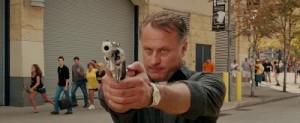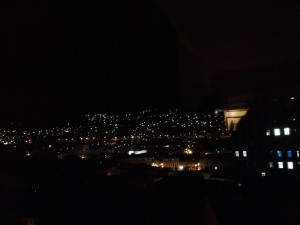I’m eating lunch and watching the movie “Abduction” on TV with my host mom. Neither of us has seen the movie before and when we finally find out that the villain is a Serb we turn to each other and laugh.
“You always have these evil Serbs or Russians in your American movies,” she comments, clearly amused but confused.
I never noticed that Serbs had any role at all in American media before I decided to come here. Maybe the “Serb” villains are portrayed so much like “Russian” villains that I didn’t realize they were supposed to be different. (Are they supposed to be?)
If the only impression you have of Serbia and its people is President Milošević and the 1990’s, then maybe the “evil Serb” motif seems fitting. But after I have been living in Serbia for about 3 months and trying to block out any outside interpretation of this country aside from my own, this Hollywood conception of a Serb seemed ridiculous. Unfortunately, an overwhelming majority of scholarly work portrays Serbs in a similar way (this is a topic a friend of mine is researching), which means this negative image is not just silly or harmless.
It was startling to see the image of the “evil Serb” when just the day before I had been telling someone how I love living in Belgrade because I view people in Serbia in such a contrasting way. People in Serbia (and Bosnia and Kosovo) are natural when they interact with each other. They do not flash superficial smiles or lie and say “I’m good!” just to be “polite” the way so many people in the U. S. do. This doesn’t mean they’re rude or unwelcoming, they’re just open. There is nothing awkward about approaching strangers to ask for help (even just a cigarette), commenting on something someone has, or starting a conversation and inviting someone to come along with you wherever you’re heading. If someone is struggling to carry a large bag onto the bus, someone else might run up and help them hoist it up, and every time an elderly woman gets on the bus someone immediately offers their seat to her. People acknowledge each other’s existence and it feels like they actually share the city instead of bustling along looking at the ground or straight ahead, locked into the individualistic mindset. People make use of public space by sitting and talking/smoking/drinking/playing music wherever they feel like it, even in the middle of the night–and why not? The city is FOR them, they may as well live in it instead of hiding in their “private property” to lead “private” lives.
People here are not enslaved by the boring, everyday routine that drains so many Americans of their humanity. They keep themselves from blending into the background or becoming constrained by menial tasks, even if it’s their job. For example, waiters are quick to make jokes or remarks, even stating their opinion if they find your order unusual or if they think you look tired.
People don’t tell you their opinion out of self-righteousness or anything like that; they tell you what they think because they want to suggest whatever it looks like you need.
Sometimes they go out of their way to make sure you appreciate simple things with them. When I was sitting on the bus pulling into Sarajevo, the man sitting behind me saw me peering into the darkness through the window to my right. “You should look left,” he suggested, or else I would have missed the thousands of twinkling lights that dotted the hills surrounding the city, almost as if the stars had fallen and nestled there.

